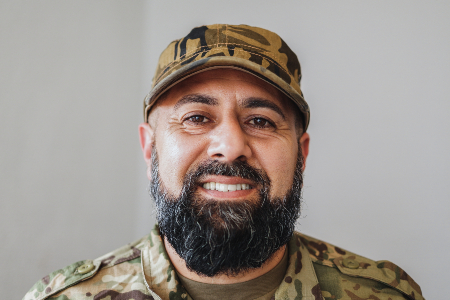Veteran Mental Health Services in San Diego
Veterans mental health is something we take very seriously at Solara Mental Health Treatment Center in San Diego. We honor those who have served and protected our country and we do all we can as a treatment facility to provide healing to Veterans in need.
Solara is a contracted treatment provider with the VA [Veterans Administration], accepting Veteran Health Administration insurance. We provide all-inclusive Inpatient and Outpatient mental health services at no cost to qualifying veterans. Long-term housing, transportation, meals, and other additional services are provided at no cost, predicated on the VA’s authorization.
If you or someone you know has been struggling with a mental illness, please contact us, today.
*Animal-Friendly Facility – we recognize the invaluable service, support, and comfort that service animals and pets provide. Our Veterans are welcome to bring their animals with them to our treatment facility, which is designed to accommodate animals.
Mental Health Programs for Veterans
Solara’s Mental Health Program for Veterans is comprised of multiple specialty programs tailored to the specific needs of Veterans.
Our Veterans PTSD Program includes separate ‘combat’ and ‘non-combat’ tracks, both of which focus intensively on complex Trauma conditions associated with military service.
Our Veterans Suicide Prevention Program is the most comprehensive prevention program in the entire treatment industry, designed specifically for Veterans suffering from depression, trauma, anxiety, and other psychological illnesses.
Additionally, we provide numerous other psychological treatment programs and services.
PTSD (Post-Traumatic Stress Disorder)
Tragically and unsurprisingly, our troops comprise the largest population in the U.S. subjected to horrific, life-threatening, and psychologically distressing exposures through their profession. Not only is direct combat unimaginably stressful, but other exposures existent within and outside of the system also cause tremendous mental and physical anguish
Some statistics to consider:
- The number of reported anxiety disorders among military servicemen/women has quadrupled in the last few years, due to the specific service, as well as global, familial, and other stressors incident to the world as it is, today.
- Approximately 20% of Afghanistan war veterans will experience acute anxiety, stress, or depression.
- Around 11-20% of veterans who served in Operations Iraqi Freedom (OIF) and Enduring Freedom (OEF) have PTSD in a given year.
- Roughly 12% of Gulf War Veterans have PTSD in a given year.
- An estimated 30% of Vietnam Veterans have experienced PTSD.
- 55% of women and 38% of men
When a person continuously re-lives their trauma, they may experience a range of symptoms:
- Intrusive memories
- Avoidance
- Negative changes in thinking and mood
- Arousal symptoms.
- Flashbacks
This trauma response is known as Post-Traumatic Stress Disorder. Because trauma so often comes with military service, PTSD is often linked to other mental illnesses as well.
Obtaining intensive, quality treatment from skilled, experienced professionals, who are experts in Veteran PTSD is paramount to gaining relief and resolution of symptoms.
Trauma-focused therapies can include:
- Prolonged Exposure Therapy (PE)
- Cognitive Behavioral Therapy (CBT)
- Eye Movement Desensitization and Reprocessing (EMDR)
- Transcranial Magnetic Stimulation (TMS)
- Others
Learn more about PTSD treatment.
Suicide Prevention
Tragically, suicide and suicidal ideation are common amongst the veteran population. Although veterans only make up 7.9% of the population in the United States, they account for 13.5% of the suicide deaths – almost double the rate of the non-Veteran population.
Solara Mental Health has the leading Veteran Suicide Prevention Program in the entire treatment field. 25-40% of the Veterans who attend our program suffer from Suicidal Ideation. We employ proven, evidence-based, robust interventions and treatment for Veterans at risk of Suicide.
Our Psychiatrists, Psychiatric Nurses, Psychologists, Clinicians, and exceptional Support Staff provide initial and continuing, comprehensive assessments and evaluations, treatment plans, and after-care plans to ensure the safety and healing of our Veterans from the moment they arrive until several months (even years) after they graduate from the program.
Our Suicide Prevention interventions include pharmaceuticals, intensive talk therapy, TMS [Transcranial Magnetic Stimulation], supportive therapies, among many other treatments.
Our Veterans overcome Suicidal Ideation through our program.
Learn more about Suicide Prevention Treatment.
Depression
Depression is the most common of all mental illnesses. It is pervasive and degrades mental health in the veteran population more than in most any other sub-set.
Causes of depression are numerous and complex among Veterans and included isolation, separation from loved ones for extended periods of time, lack of family/loved one support systems, combat stressors, living in harm’s way oneself and/or living with others in harm’s way, continually.
Depression is a highly treatable psychological illness with many treatment options. Treatment options for depression may include pharmaceutical (medication) intervention, talk therapy, neuro-modulation, among many others.
Learn more about Depression Treatment.
Anxiety
Veterans have been shown to be more susceptible to anxiety due to PTSD, and other associated issues. Military professionals experience anxiety in both combat and non-combat environments, while in service, as well as in life after active duty, which contains a multitude of anxiety-inducing triggers, and stressors.
Types of anxiety in veterans might include:
- Generalized Anxiety — which can be caused by a range of daily occurrences.
- Social Anxiety — where social situations make a person feel anxious.
- Phobias — where a person has intense fears of specific situations or of certain objects.
- Panic Attacks — which can be unexpected episodes of panic.
Treatments for anxiety typically include pharmaceutical interventions/management, talk therapy, neurological interventions, physical therapies, animal therapy, among many others.
Learn more about Anxiety Treatment.
Bipolar Disorder
Combat in war can lead to extreme emotional volatility. It can be debated whether these circumstances can appropriately signal bipolar disorders in a clinical setting. Other researchers argue that bipolar disorder (BPD) rates are very high in veterans with PTSD and that this BPD is underdiagnosed.
The stresses one goes through during combat may put them in mental states very similar to manic and hypomanic phases of BPD. Being exposed to these types of pressures can even cause psychotic features. And, being exposed to these states of mind can potentially have lasting effects. A 2010 study has also shown that roughly 9% of veterans suicides (in years 1998-1999) had links to bipolar disorder.
These realities place emphasis on the need to address mental illnesses like bipolar disorder with proper care and professional treatment. Signs of mental illness and emotional distress should not remain buried under “thick skin.”
Treatments for bipolar disorder include particular types of psychotherapy and adjunct medications to stabilize one’s mood. Whichever treatment is best will vary depending on the symptoms and circumstances of each individual.
Learn more about Bipolar Treatment.
Personality Disorder
Personality disorders can be characterized as rigid and unhealthy patterns of thinking. A person with a personality disorder will have trouble perceiving situations and relating to people in a suitable manner.
In the military, a person may be discharged for a personality disorder. Some argue that this is sometimes done to rid of “problem soldiers.” And others may find that they eventually fall under another diagnosis, such as PTSD. One study even concludes that symptoms of PTSD and borderline personality disorder are related to one another, but in a complex way that cannot be adequately described in linear models.
Personality disorders are among the most misunderstood, most misdiagnosed, and most stigmatized mental disorders. They are also difficult to treat, but not impossible.
Medications, psychotherapy, group therapy, and family therapy can help improve one’s personality disorder condition. There are also a number of different personality disorders that can be treated in widely different ways.
Learn more about Personality Disorder Treatment.
Veteran Therapy Services
Maintaining physical health is just as important as maintaining mental health, despite stigmas that may surround seeking treatment for mental conditions. Reaching out for help is a crucial step and often delayed. However, overcoming these struggles can improve one’s life drastically and be rather rewarding.
Aside from a range of medications, there are many therapeutic options that can help improve the quality of life for veterans and their families. True healing typically comes from addressing underlying issues and talking through them with psychotherapy.
Some effective and common forms of psychotherapy for veterans include cognitive behavioral therapy, dialectical therapy, EMDR, and prolonged exposure.
Cognitive Behavioral Therapy (CBT) has become the gold standard of psychotherapy. CBT allows a patient and counselor to identify problematic thoughts and behaviors. Then, they can work through solutions to said problems. With mental illnesses, there is often a cycle of problematic thoughts, behaviors, and emotions — and breaking these cycles can do wonders for one’s mental health.
Dialectical Behavior Therapy (DBT) is a CBT approach that is more focused on interpersonal skill-building and self-reflection. It also emphasizes veteran-counselor relationships in which both can share more truthfully and trustfully with one another. It also teaches veterans mindfulness, distress tolerance, interpersonal effectiveness, and emotional regulation.
Eye Movement Desensitization and Reprocessing (EMDR) is an approach that is done in phases and slowly re-introduces trauma-related images, thoughts, emotions, and sensations. These are re-introduced as the treating therapist has the veteran focus on bilateral stimulation (usually eye movements). This is thought to desensitize the vividness of the experience while still allowing the veteran to talk through events with new insight. It is a common form of therapy used to treat PTSD.
Prolonged Exposure (PE) is a form of CBT that helps patients gradually approach trauma-related events and emotions. Rather than avoiding these thoughts and reinforcing fears, PE can help a patient slowly overcome their fears. The American Psychiatric Association strongly recommends PE to those struggling with PTSD.
Transportation, Housing, & Accommodations for Vets
Solara Mental Health is able to provide transportation to and from its facilities in San Diego, CA.
Along with transportation, Solara can provide long-term housing at its beautiful Pacific Beach, San Diego residences that are close to the treatment center. These housing accommodations can be provided for both inpatient and outpatient treatment that may follow inpatient treatment.
Veterans may remain in housing for as many weeks or months as the VA insurance authorizes. We often find that the VA authorizes a considerable length of stay, allowing us the ability to provide quality treatment for the amount of time needed to heal and recover.
View our facilities in Pacific Beach to get a preview of what you might expect when choosing Solara Mental Health as your care provider.
Mental health should be taken seriously, especially veteran mental health. The psychological effects of military service leave our beloved troops at a higher risk for trauma and hence developing mental illnesses. Rather than hide psychological troubles due to stigma, we highly encourage seeking professional mental health care.
Solara Mental Health is VA contracted as a community care provider, to provide quality in-residence accommodations and outpatient treatment. We are passionate about providing quality mental health rehabilitation and passionate about taking care of the great warriors that have made our nation what it is today.
If you are a veteran struggling with mental health concerns, please call (844) 206-9722 to discuss a treatment plan that is right for you with one of our specialists.


![Solara Mental Health is a contracted treatment provider with the VA [Veterans Administration] and proudly accepts Veteran Health Administration insurance Solara Mental Health is a contracted treatment provider with the VA [Veterans Administration] and proudly accepts Veteran Health Administration insurance](https://solaramentalhealth.com/wp-content/uploads/veteran-health-administration-insurance-300x100-1.png)



